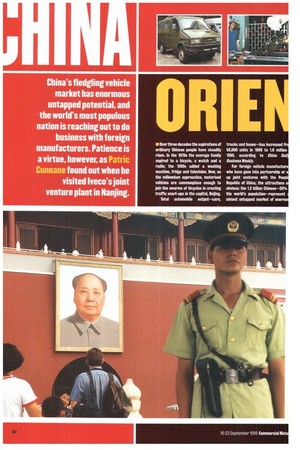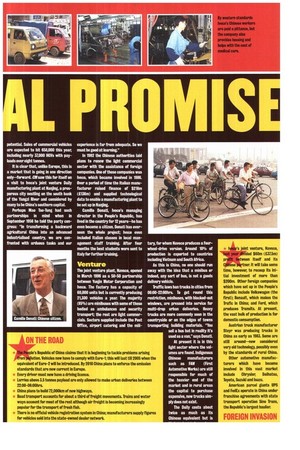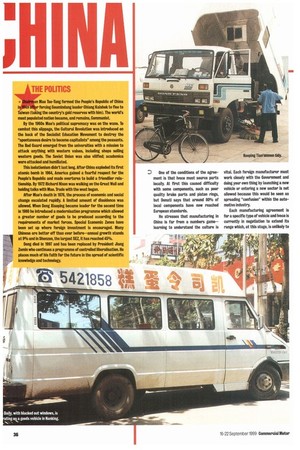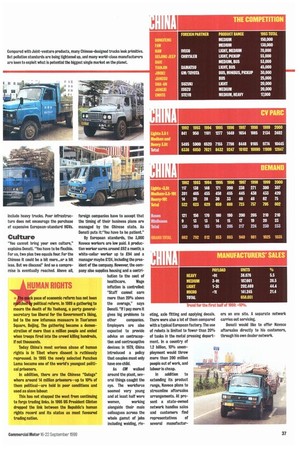• Over three decades the aspirations of ordinary Chinese people
Page 38

Page 39

Page 40

Page 41

If you've noticed an error in this article please click here to report it so we can fix it.
have steadily risen. in the 1970s the average family aspired to a bicycle, a watch and a radio; the 1980s added a washing machine, fridge and television. Now, as the millennium approaches, motorised vehicles are commonplace enough to join the swarms of bicycles in creating traffic snarl-ups in the capital, Beijing.
Total automobile output—cars, trucks and buses—has Increased ft 56,000 units In 1966 to 1.6 million 1998, according to China Dail Business Weekly.
For foreign vehicle manufactur who have gone into partnership or up joint ventures with the Peopl Republic of China, the attractions obvious: the 1.2 billion Chinese-20% the world's population—represent almost untapped market of enorm potential. Sales of commercial vehicles are expected to hit 658,000 this year, including nearly 37,000 HCVs with payloads over eight tonnes.
It is clear that, unlike Europe, this is a market that is going in one direction only—forward. CMsaw this for itself on a visit to Ivaco's joint venture Daily manufacturing plant at Nanjing, a prosperous city nestling on the south bank of the Yangzi River and considered by many to be China's southern capital.
Perhaps Mao Tse-Tung had such partnerships in mind when in September 1956 he told the party congress: In transforming a backward agricultural China into an advanced industrialised country, we are confronted with arduous tasks and our experience is far from adequate. So we must be good at learning."
In 1982 the Chinese authorities laid plans to renew the light commercial sector with the assistance of foreign companies. One of these companies was lveco, which became involved in 1986. Over a period of time the Italian manufacturer raised finance of $218m (£136m) and supplied technological data to enable a manufacturing plant to be set up in Nanjing, Camillo Donatl, Iveco's managing director in the People's Republic, has lived in the country for 12 years—he has even become a citizen. Donati has overseen the whole project; Iveco even included Italian classes in local management staff training. After four months the best students were sent to Italy for further training.
Venture
The joint venture plant, Naw:teo, opened in March 1996 as a 50-50 partnership between Yuejin Motor Corporation and !veep. The factory has a capacity of 60,000 units but is currently producing 21,300 vehicles a year. The majority (85%) are minibuses with some of these bodied as ambulances and security transport; the rest are light commercials. Sectors supplied include the Post Office, airport catering and the mili tary, for whom Naveco produces a fourwheel-drive version. Around 10% of production is exported to countries including Vietnam and South Africa.
As this is China, no one should run away with the idea that a minibus or indeed, any sort of bus, is not a goods delivery vehicle.
Traffic laws ban trucks in cities from 06:00-22:00h rs. To get round this restriction, minibuses, with blacked-out windows, are pressed into service for multi-drop urban deliveries. Heavy trucks are more commonly seen in the countryside or on the edges of towns transporting building materials. 'You sell a bus but in reality It's used as a van," says Donatl.
At present it is in this light sector where the volumes are found. Indigenous Chinese manufacturers such as NM (First Automotive Works) are still responsible for much of the heavier end of the market and in rural areas the capital to purchase expensive, new trucks simply does not exist.
The Daily costs about twice as much as Its Chinese equivalent but Is One of the conditions of the agreement is that Iveco must source parts locally. At first this caused difficulty with some components, such as poor quality brake parts and piston rings, but Donati says that around 80% of local components have now reached European standards.
He stresses that manufacturing in China is far from a numbers game— learning to understand the culture is vital. Each foreign manufacturer must work closely with the Government and doing your own thing by launching a new vehicle or entering a new sector is not allowed because this would be seen as spreading "confusion' within the automotive industry.
Each manufacturing agreement is for a specific type of vehicle and Iveco is currently in negotiation to extend its range which, at this stage, is unlikely to
include heavy trucks, Poor infrastructure does not encourage the purchase of expensive European-standard HCVs.
Culture
You cannot bring your own culture," explains Banat. You have to be flexible. For us, two plus two equals four. For the Chinese it could be a bit more...or a bit less. But we discuss!" And so a compromise is eventually reached. Above all, foreign companies have to accept that the timing of their business plans are managed by the Chinese state. As Donati puts it:"You have to be patient."
By European standards, the 3,000 Naveco workers are low paid. A production worker earns around 262 a month; a white-collar worker up to 294 and a manager maybe 2124, including the president of the company. However, the company also supplies housing and a contribution to the cost of healthcare. Wage inflation is controlled: "Staff cannot earn more than 20% above the average," says Donati. "WI pay more it gives big problems to other companies. Employers are also expected to provide advice an contraception and contraceptive devices: in 1979, China introduced a policy that couples must only have one child.
As CM walked around the plant, several things caught the eye. The workforce seemed very young and at least half were
women, working alongside their male colleagues across the whole gamut of jobs including welding, riv ding, axle fitting and applying decals. There were also a lot of them compared with a typical European factory. The use of robots Is limited to fewer than 20% of tasks In the metal pressing department. In a country of 1.2 billion, 10% unemployment would throw more than 200 million people out of work, and labour is cheap.
In addition to extending its product range, Naveco plans to streamline aftersales arrangements. At present a state-owned network handles sales and customers find representatives of several manufactur ens on one site. A separate network carries out servicing.
Donati would like to offer Bayne aftersales directly to his customers, through his own dealer network,










































































































